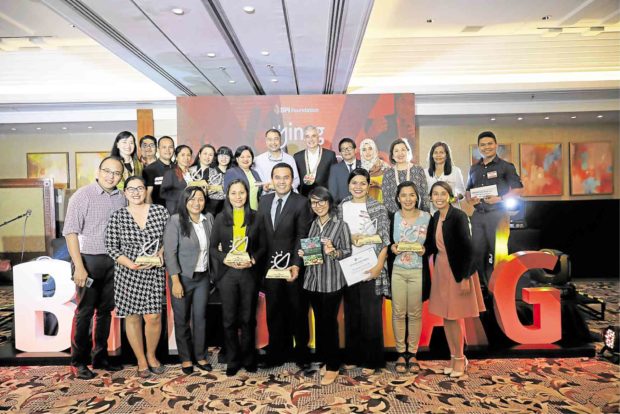As towering buildings continue to sprout in Metro Manila and other city centers, a social enterprise is tirelessly working on setting up its own towers—those that can help urban dwellers grow their own food in the comfort of their own homes.
These towers are, basically, vertical gardens designed and sold by Down to Earth, the top winner of this year’s BPI Sinag Awards, which is handed out annually by BPI Foundation to the country’s best social enterprises.
The towers, says Down to Earth’s Nico Aberasturi, can carry up to 50 plants each, and can be placed both outdoors and indoors.
Aberasturi, who comes from a family of farmers, says the idea of these towers was inspired by Down to Earth’s urban gardening workshops, which it holds regularly in its Makati City cafe.
“Half of the people who came to our workshops didn’t have land, and that presented a problem—how could they grow their own food if they lived in condominiums, apartments?” Aberasturi says.
Before establishing Down to Earth, Aberasturi says his family used to produce just beef in the 1990s.
Organic vegetable farming became an “accidental” venture, as he says they were required by government to compost their cow manure.
Now, all their produce—vegetables, beef, chicken, lamb, pork—are organically and sustainably grown in Bukidnon province.
Composting is also a regular workshop topic at their cafe, says Aberasturi, as it makes good use of food waste, which is abundant, especially in urban areas.
Workshops cost P2,500 for homeowners, or P1,500 for their helpers.
As for their tower gardens, Down to Earth sells different kinds, depending on the type of plants one wants to grow.
There is the Bahay Kubo (eggplant, tomatoes), the Salad Bar (lettuce, arugula, tomatoes, cucumber, chili pepper, baby kangkong, water spinach, red spinach, blue pea, etc.) and the Pizza Tower (arugula, basil, chili, tomatoes, Italian oregano, Vietnamese coriander, chives).
They even have a Flower Tower, which Aberasturi says they plan on placing in more parking lots.
Thanks to their BPI Sinag win, the social enterprise also plans on partnering with more establishments so that more tower gardens can go up and breathe new life into cities—as well as inspire a new generation of urban-dwelling farmers.
Down to Earth already works with a few orphanages, where they teach the children how to do their own compost and grow their own tower gardens.
“Small spaces can really produce a lot, without a doubt, if you just plan properly. We’re losing farmers in rural areas because it’s difficult to survive. So why can’t we bring the farms to all these homes in the urban areas?” Aberasturi says. “Now we’re slowly starting to build a new generation of farmers in urban areas.”
Aside from Down to Earth, other 2019 BPI Sinag awardees include: Gi Crafts Shell Museum and Gallery, which takes guests on an educational experience while providing job opportunities for local communities; Organic Growth, which trains farmers on how to grow organic vegetables, showing them modern techniques and introducing new and prolific varieties of seeds; Malingkat Enterprise, which sells local handwoven fabrics, with special focus on Mindanao weaving communities; Mavil’s House of Mushrooms, a substitute for the usual junk food, which also provides livelihood for farmers, who are introduced to the proper technology in mushroom cultivation and product development;
Meaningful Travels PH, a travel experience that merges adventure, cultural immersion and giving back to communities by patronizing their local businesses and products; Halal Organic Crops Production, producers of organic vegetables, free-range chickens and halal chicken siomai, which also conduct training among beneficiaries, who are victims of the Marawi City siege; Sabang Daguitan Surf Camp and Dao Balay Kawilan, which promote ecotourism and organic farming while providing sustainable livelihood to communities in Dulag, Leyte, and addressing issues such as unemployment, access to health care and education, and environmental protection;
Subida, which designs manufactures, and sells unique Philippine souvenirs and crafts produced by marginalized local artisans from Negros Oriental and Siquijor; and Yumi’s Farm, a bed and breakfast that offers seminars and training in organic farming, as well as ecotourism activities such as farm tours, planting, feeding farm animals, trekking to local waterfalls and community immersion.
The top five will receive cash grants worth P500,000, while the top six to 10 will receive P100,000.
All winners will undergo a six-month mentorship program by pioneering social enterprise incubator Bayan Academy for Social Entrepreneurship and Human Resource Development.
Now on its fifth year, the BPI Sinag Awards sought to reach out to more service-based social enterprises nationwide, especially those involved in health care, food and beverage, education, renewable energy, agriculture, technology, textiles, manufacturing, tourism, food processing and arts and crafts, says Maricris San Diego, BPI Foundation executive director.
“We’re very happy that we were able to achieve this with good representation from Luzon, Visayas and Mindanao, and in fact, our 2019 awardees largely come from Visayas and Mindanao,” she says. “What’s great about this year is we have been able to receive more agribusiness social enterprises responding to food security, a cause which we at BPI Foundation are really passionate about.”
